- Home
- Aharon Appelfeld
To the Edge of Sorrow Page 2
To the Edge of Sorrow Read online
Page 2
Felix is a superb fighter but never served in an army. He’s an engineer whose buildings resemble him, low and sturdy. I once heard him say, “A house without a garden is not a house.” He says little and explains little; it’s hard to get a complete sentence out of him. As opposed to Kamil, Felix inspires silence; he walks in the lead, and we all follow him with confidence. More than once, we were taken by surprise and found ourselves at a disadvantage. Felix is an expert in stressful situations. His ability to stand firm under fire, to execute an orderly retreat, are wonderful to behold. He does everything quietly, with sealed lips, never getting angry or casting blame. It’s not easy to follow his example, but the moment you obey his orders, you feel sure of yourself.
In the past there were differences of opinion between these two great commanders. Kamil tried to instill some of his beliefs in his deputy. Felix dislikes being preached to. He doesn’t talk about his views and beliefs. But one time he couldn’t contain himself, broke his silence, and declared, “In my opinion one must not mix matters of the spirit with deeds. A fighting organization cannot afford to deal with beliefs and opinions; these should be left until after the war.” Kamil, of course, disagrees with this way of thinking. Felix resigned his position, and Kamil realized that without Felix he could not lead us in battle. In the end they compromised, and it was decided that in matters of belief and opinion each person would abide by his own principles.
But don’t be misled by the differences between them. As I said, Felix also has opinions, perhaps not as fully formed as Kamil’s, but he, too, is sensitive to words and phrases. When he hears a false or exaggerated word, he winces. He seems to have derived his feelings from music. He began playing the cello as a boy, and once in a while we hear him quietly singing a Bach cantata. Felix is sometimes perceived as one-dimensional, which is a mistake. True, he can be silent for an entire day, but when he does express an opinion, you come to realize that he is precise and succinct, and no sight or sound escapes his attention.
4
I’ve gotten ahead of myself.
The first team to escape from the ghetto set for itself the goal of rescuing as many people as possible. In the first wave they were able to bring out another five, plus a boy of about two whom they found outside the ghetto, not far from the fences.
Kamil claimed the child would be the good luck charm who would inspire the group to perform wonders. The ghetto had not yet been destroyed, and the team led by Kamil and Felix tried to dig a tunnel into it. But, unfortunately, the watchtowers were manned day and night, and searchlights scanned every square foot. They were nevertheless able to smuggle out a few people who went out to work and a few who were standing at the train station. I, too, by luck or a miracle, joined them.
We are now forty-four in number. We are fighting for our lives, but we fear most of all for the child. After every drill or action, we gather around him, not as a child who doesn’t speak but as someone who can bless us when we go out and when we return. His very existence is a miracle. Most of the day his eyes are wide open; he never cries or asks for anything, but when you touch him, his shoulders recoil.
At first we called him “boy,” but one of the fighters happened to call him Milio, and now that’s what everyone calls him. I think the name fits him. Milio doesn’t ask questions; his eyes say, I have no words to tell you what I see and hear; don’t ask me. But the comrades ignore his mute request, though they can see that questions pain him.
Once, one of the fighters got down on his knees and innocently asked, “How do you feel, Milio?” Milio hunched his shoulders and covered his eyes with both hands. For a moment it seemed like he would burst into tears. We were wrong. He pursed his lips.
Most of the day he sits in his tent. Now and then he gets up and goes outside. He’s a strange, mute little creature, incapable of clear expression, whose every tiny gesture makes us happy. In truth, he does nothing but merely watches.
When we aren’t training or going on an ambush, Danzig carries Milio close to his chest in a big farmer’s kerchief. Danzig is our giant. He is about six feet six inches tall, and who knows how wide his shoulders are. Sometimes Danzig tries to make Milio laugh, but Milio is cautious and wary of trusting people.
What happened to him, how he lost his parents and landed outside the ghetto walls is hard to know. Danzig believes we need to be patient. He senses that Milio will eventually reveal his secrets, but we mustn’t pressure him.
In the evening we sit around him. If he would cry or express unhappiness, his existence would be more comprehensible. His serene silence is a riddle that grows day by day. Not long ago we still expected that one morning he would surprise us by speaking a word. The days have gone by, and Milio’s muteness endures in his every pore.
One day he suddenly fell ill with typhus. For two weeks he burned with fever. Danzig did not budge from the tent where he lay, and we were all on alert.
After his fever went down, Milio opened his eyes and looked at us. It was hard to know if he recognized us or if he was searching for his lost parents. Danzig spoke to him and said, “Thank God, the fever went down, and now you’ll feel much better.”
From day to day Milio’s face brightened. Danzig was as happy as a child and fed him semolina porridge. Most of the day Milio was curled up, sleeping. The sleep was good for him. After about two weeks of sleep, he got up and looked around with a fresh gaze, and we knew that he was a perceptive child.
Danzig feels that Milio has a different sort of understanding.
“How can you tell?” asked one of the fighters.
“It’s hard to explain.”
Milio sometimes seems like a creature who has survived by miraculous means. The miracle was so powerful that it muted the few sounds he’d been able to make.
Danzig believes that Milio is hiding a secret. It’s hard to argue with a giant like Danzig.
We love Milio’s sleep. A fine, milky mist hovers over his sleep, meaning he is still tied to his mother.
When Milio wakes up, Danzig declares “Milio is awake,” as if the miracle had returned and was revealed anew. Danzig himself has changed since he adopted Milio. The silent wonder of the child is reflected in his face and makes him a man who glows with an inner light.
* * *
—
WE’VE BEEN TOGETHER only a few months, but it sometimes seems as though we’ve been wandering for years on this uncharted land with an unknown future. Kamil does not instill false hope. Indeed, he increasingly demands exact compliance with his orders, but he goes easy on the weaker people. At times it appears that the purpose of our lives now is to protect those who cannot protect themselves.
5
Our daily schedule begins with exercise and running. Breakfast at seven. Tsila, our cook, prepares the meals with the help of older people who are not fighters. The morning menu: semolina or corn porridge, a slice of bread with jam, coffee or tea. Our menu is modest yet filling.
At eight o’clock we go out to train. Kamil insists on a neat appearance and clean weapons. It wasn’t easy to get the first rifles. We now have ten rifles, twelve pistols, and grenades. These weapons are insufficient for directly confronting hostile patrols, so we lie in ambush and sometimes manage to surprise them. A while ago we surprised a patrol. Two of them were killed, and the rest ran away, leaving behind six rifles and many cartridges. Our arsenal thus grew all at once, and in honor of the victory and the booty, we celebrated that night.
Once or sometimes twice a week we raid the houses of farmers. Truth be told, this is not pleasant work. In the summer we would raid fields and orchards and bring fruits and vegetables to the base. But in this season the fields are barren and gray. There is nothing to be found. With no alternative, we raid houses, plunder the food and clothing, and look forward to days when more fighters will join us and we can raid military camps.
Meanwhile, our shared lives, the drills an
d the raids, have forged us into a unit. If not for Kamil, who insists on sharp performance, our days would slip into blind routine. Kamil is not religious in the common meaning of the word but an enthusiast in every sense: sometimes it’s a plant or flower that inspires him, sometimes a word. When Kamil reads from the Book of Psalms, it gives you goose bumps. His orders are simple and clear, but at times he utters a rhythmic sentence that seems transmitted from the distant past.
Kamil wanted to organize evenings of study, but it’s hard to do so without texts. For years books were our mainstay, and suddenly we were cut off from them. It was odd how we got accustomed, in so short a time, to living without them. Sometimes, mostly in late afternoon, I imagine that I have a book in my hands. I look around and remember that at this hour I would hold a book and read. I read Crime and Punishment before it was assigned for school. Its sentences swept me away like rushing waters. Now we lived without books and notebooks, pencils and pens, as if stripped of our insides. If not for one small volume of psalms, brought by one fighter, we would have no physical claim on a world we lived in yesterday.
Books, books, where are they? As if they never were, I sometimes hear, not a lone voice but a collective moan arising from within. Books, in truth, are what separate our lives then from our lives now. One of the fighters, a sensitive young man, delivered his opinion with subtle, tight-lipped irony: “We have returned to nature. In two or three months we’ll be like cavemen. We won’t talk; we’ll howl, laugh, and bark, and maybe that’s better.”
Kamil heard this and reacted immediately. “We have not come here for that. We will maintain our humanity even here, and we will not let evil deface us. The study evenings will take place at first without texts, but don’t worry; we will find books somehow.”
6
Kamil had prophesied without knowing it. Loaded with supplies on the way back to the base after a tough raid, we saw at a crossroads a Jewish home that had been broken into. When we went inside, a great surprise awaited us. The house was bare of any furniture, any dish or bedsheet, but in two alcoves, arranged on shelves, were many books. Kamil immediately ordered us each to take at least ten books. And so we lucked upon a Hebrew Bible, a Bible in the poet Yehoash’s Yiddish translation, and another one in Luther’s German translation, an elegant Hebrew prayer book, a very old High Holiday mahzor, and many other rare books. The books were damp and mildewed but complete.
* * *
—
ON EVERY RAID we pass an abandoned Jewish home in the countryside. These are now mostly occupied by Ruthenians who remodeled them, but sometimes the abandoned house remains in its original form. The new residents wear the clothes of the former residents, and for a moment their appearance is deceptive.
On one of the raids, Salo discovered the house of his Uncle Herzig: a big house with many lamps. This was before dawn, and we were on our way to the base. Salo, who was shaken by what he saw, asked Felix for permission to go inside to see what was left.
The new residents, startled by the raid, were ordered to sit on the ground. Felix immediately announced that we were partisans and requested that they contribute to the war effort.
“We have nothing,” said the father of the family.
“The house is full of fine furniture, expensive lamps, and you say you have nothing.”
“Take a piece of furniture if you want,” he said with a snicker.
“We do not need furniture. We are looking for necessities, warm clothes, blankets. By the way, whose house is this?”
“Mine.”
“You inherited it?”
“That’s right.”
“And if we tell you this is a Jewish house and you took it over, what would you say?”
“I would say that’s not true.”
Felix did not continue to argue. He ordered a search.
The house was full of city clothes, blankets, and down quilts, and in the dining room there were elegant utensils—candlesticks, a spice box—and a charity box from the Jewish National Fund.
It had been a long time since we’d seen clothes that Jews wore. There was still an odor of camphor in the closets.
Salo trembled. He used to come here during the Passover holiday to study for semester exams and spend time with his cousins. Those had been splendid days of heart-to-heart conversation, of hikes by the river, and of tastes and smells of Jewishness.
We filled four sacks with clothes and blankets, and we also took the candlesticks, the spice box, and the charity box from the Jewish National Fund.
“Why are you taking our clothes?” the father on the ground asked anxiously.
“They are not your clothes.”
“They are mine.”
“If you keep lying we will punish you. Do not forget. We are partisans fighting for our lives, and anyone who opposes us risks his life. And where are the books?” said Felix.
“I have no books.”
“If you don’t show us right now where you threw the books, we’ll burn down the house.”
“Have mercy on me and my children.”
“We’ll have mercy if you show us where you threw the books. There were many books here.”
“I burned them.”
“Why did you burn them?”
“I didn’t know what to do with them.”
“Where did you burn them?”
“Behind the stable.”
“Damn you. Show us where you burned them,” Felix persisted.
“Don’t kill me. I have five children.”
Two fighters went with him behind the barn. In the pile of ashes a few unburned pages remained. Salo took a half-burned page with the words of the morning prayer Modeh Ani: I give thanks to God for restoring my soul.
We retreated according to standard procedure, and it was good that we were cautious. We were no more than two or three hundred feet from the house when the farmer and his older sons came out of the house and, joined by neighbors, began to shoot at us. Felix ordered us to put down our supplies and attack them. Which is what we did. Within minutes the shooting stopped. This was not enough for Felix. He ordered us to set the house on fire. And that is what we did.
7
We went on our way loaded with books and supplies. We hadn’t touched a book for a long time. Our inching across the hills and the exhausting search for food had distanced us from ourselves. Among the books we carried off was Dostoevsky’s Crime and Punishment, reminding me that I did not complete my matriculation exams and would have to be tested when the war was over. Oddly, this familiar book did not move me. Life in the unit, the training, the raids fill me to the brim. At night I drop to the ground and sleep without dreams.
Kamil was emotional and said, “A great treasure has fallen into our hands. Let us try to be worthy of it. Life without books is a crippled life. Now we will replace what is missing.”
That same night we drank the wine we took in the raid and sang our hearts out. No wonder the guards didn’t get up on time for duty. Kamil complained but did not get angry.
That same week we were introduced to the religious teachings of the Ba’al Shem Tov in the book edited by Martin Buber. Kamil told us that the Besht, as he was known, the founder of Hasidism, walked these very hills, where he meditated and conceived his teachings. “What a privilege for us,” he said.
Even this excitement did not escape criticism. Every word out of Kamil’s mouth is examined under a magnifying glass: Why is he using the word “privilege”?
Kamil, like most of us, is not an expert in Jewish texts, but his curiosity about all things Jewish makes him a man filled with wonder. On one evening, one of our rationalists said, not without sorrow, that Judaism was beyond our reach. It’s an ancient, complex culture, and if one is not exposed to it from childhood, its iron gates refuse to open. You read one book and another book, and you understand how far you are from
understanding.
Kamil disagreed. Martin Buber, he argued, is the guide for the perplexed of our generation. His books I and Thou and Tales of the Hasidim, which we brought from that wondrous house, can illuminate the soul. There were those among us who argued that Buber beautified Judaism, put cosmetics on its face in order to find favor with German Jews, but let’s put that aside for now.
* * *
—
SHORTLY THEREAFTER we were discovered by a patrol of Ukrainian collaborators who opened fire on us. Two of our comrades were wounded. Luckily, one of our own patrols was coming back at the same time and quickly joined us, and we returned fire. The hostile patrol was forced to retreat, leaving behind one dead and an automatic rifle.
The enemy does not relent: the next day we again encountered a hostile patrol, but we were ready for it and fought back. So it was, every few days. The Germans are stubborn and fight us fiercely. With good reason, Kamil decided that we had to leave the hills and advance into the wetlands.
But now it’s different: we have books. Hermann Cohen, a short man with a sunny disposition, is in charge of equipment and lends each comrade a book. A thorough survey indicated that most of the books have to do with Judaism. Apparently the owner of that library was a man of broad horizons who chose his books carefully. It’s hard to know if he was religiously observant. I imagine him to be a tall, good-natured man who stands in the doorway of his home as evening falls and looks at the trees and their falling leaves. The big leaves, red and yellow, refuse to wilt, their colors growing stronger by the hour. This pleases him, and he decides to go into his big house and turn on the lights.
It’s strange what a bundle of books can do. Our temporary base, every canvas tent a sign of impermanence, has suddenly changed, as if distant visions, quiet and calm, have arrived as our guests.

 Long Summer Nights
Long Summer Nights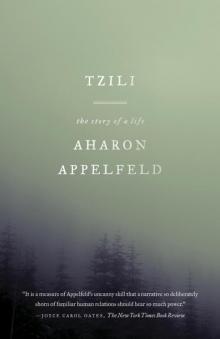 Tzili
Tzili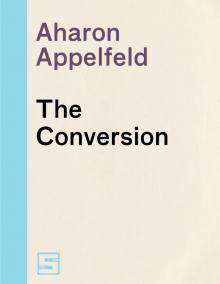 The Conversion
The Conversion The Iron Tracks
The Iron Tracks All Whom I Have Loved
All Whom I Have Loved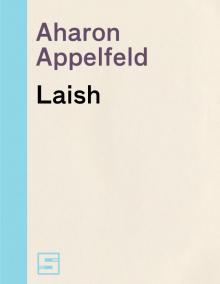 Laish
Laish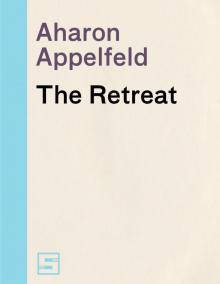 The Retreat
The Retreat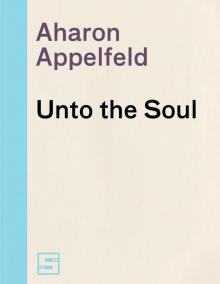 Unto the Soul
Unto the Soul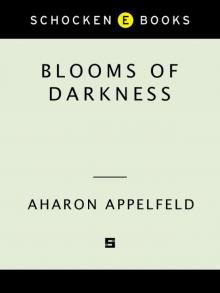 Blooms of Darkness
Blooms of Darkness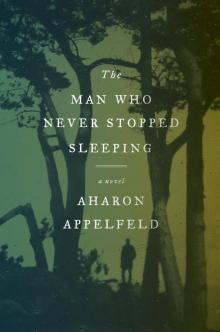 The Man Who Never Stopped Sleeping
The Man Who Never Stopped Sleeping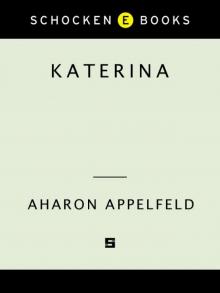 Katerina
Katerina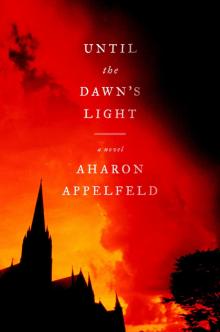 Until the Dawn's Light
Until the Dawn's Light Adam and Thomas
Adam and Thomas Suddenly, Love
Suddenly, Love